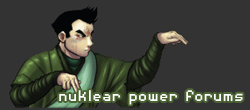So I've been paying attention to some of the criticisms that the Feds use to take down websites:
Here's one.
Linkage
I figure I'll critique this one where Mr. Hart is comparing the web domain to real estate. IMO, it's apples to oranges. He basically ignores the fact that the government has chilled free speech because a person hasn't gotten a notice or WHY their site is taken down. It's similar to a raid on a drug dealer's house, which is what I hear it's compared to.
Anyway, my critique:
Here, he gives us a general overview of the difference between the two. I won't put it on here making my critique even longer.
Short summary: Semantically speaking, these were forfeitures by his reckoning. Because copyright law favors the industries, you're committing a crime by having a website based on music or movies that may have an image the MPAA or RIAA don't like.
He also talks about the COICA enhancing these laws.
Here be very careful of the strawman:
Quote:
|
In making the claim that domain names present special circumstances, critics of the seizures seem to want to have their cake and eat it too. They say these seizures are unconstitutional — they should be subject to higher standards of due process because owners of domain names are being deprived of something more than owners of all other types of property subject to seizure. But at the same time, they say these seizures are ineffective because the owners aren’t being deprived of anything — they still have their content and servers, their sites can still be accessed by IP address, and in many cases, the owners have registered new domain names for their sites within hours of the seizures.
|
What is not being mentioned is that these servers are being set up outside of the US or with other countries, making our economy even weaker.
Let's look further...
Quote:
|
Domain names are not real estate, and the reasons in James Daniel Good Real Property for requiring a pre-seizure hearing are not applicable to the seizure of domain names. The “risk of error” involved in seizing domain names is no higher than those involved in the seizure of personal property: the content and servers are still available to the owner, the site can still be accessed through the IP address, and it is relatively easy for the owner to acquire a new domain name — something many of those affected did within hours of having their domains seized.
|
Here, the strawman bites again. Telling us about real estate then comparing it to a domain name. At the least, out of the 82 sites, there's three, possibly more, that had NOTHING to do with piracy in any way, shape or form. Two were music blogs. The third was a search engine. Imagine the inconvenience of having to find new domains in the middle of the night because some government entity decided to take your site down. Saying it's relatively easy to set up another one ignores the entire process that one must go through for this. And if
One site is innocent in this, then honestly, why is it so easy to take down, and so hard to put back up?
Quote:
|
Thus, the forfeiture of domain names present the same considerations that the Supreme Court has held justify postponing notice and hearing until after seizure in Calero-Toledo. The seizure permits the US “to assert in rem jurisdiction over the property in order to conduct forfeiture proceedings, thereby fostering the public interest in preventing continued illicit use of the property and in enforcing criminal sanctions”, domain names “could be removed to another jurisdiction, destroyed, or concealed, if advance warning of confiscation were given”, and “seizure is not initiated by self-interested private parties”, but by federal officials.
|
I've yet to hear about ANY of the sites having to face a court and explain their sites. All I've heard about are takedowns. So how is that not censorship? And don't people that live in seized real estate GET a court date? WTF, ICE?
Quote:
|
SEIZURE AND THE FIRST AMENDMENT
|
Quote:
|
The Supreme Court has addressed the implications of the First Amendment in seizures most often under laws prohibiting obscenity. Obscenity is not protected by the First Amendment. Seizure of obscene materials, whether to use as evidence in a criminal trial or to initiate forfeiture proceedings, requires a close look by courts because of the risk that nonobscene, protected speech might end up being blocked
|
Well, how the HELL are we supposed to know what's obscene if it's censored?
Quote:
|
In effect, the Court recognizes the danger that too long of a temporary restraint on speech-related items can have the effect of a final restraint
|
It's been six months since the FIRST takedowns. How long is this temporary restraint going to take before it IS a final restraint?
Quote:
|
The seizure of these 82 domain names satisfy both due process and the First Amendment.
|
Laughable at best... But he's serious.
Read if you want. I quite frankly am disappointed in the fact that he's nothing more than a shill for prosecution of current copyright law.








